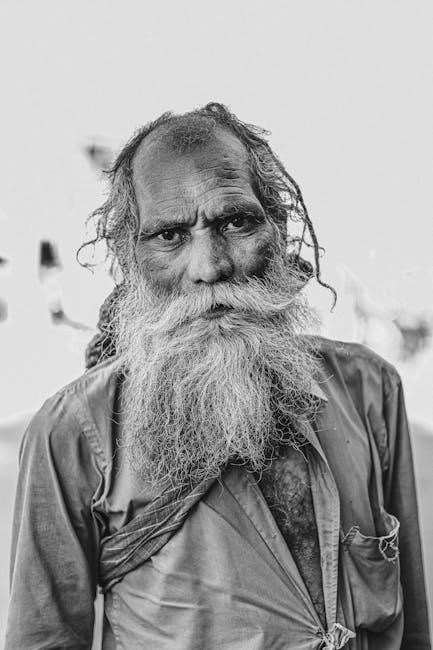Olaudah Equiano’s autobiography, The Interesting Narrative of the Life of Olaudah Equiano, is a pivotal work in the genre of slave narratives, detailing his journey from enslavement to freedom and his role in the abolitionist movement. Published in 1789, it remains a powerful account of resilience, cultural identity, and the horrors of the transatlantic slave trade, profoundly influencing public opinion and literature.
1.1. The Historical Significance of “The Interesting Narrative of the Life of Olaudah Equiano”
Olaudah Equiano’s autobiography holds immense historical significance as one of the first slave narratives to gain widespread attention. Published in 1789, it vividly chronicled the horrors of the transatlantic slave trade, enslaved life, and the journey to freedom, humanizing the experiences of enslaved Africans. The narrative became a pivotal tool in the British abolitionist movement, influencing public opinion and policy. Its detailed accounts of brutality and resilience provided a personal perspective, making it a cornerstone of anti-slavery literature and a testament to the enduring fight against oppression, shaping historical and literary understanding of slavery’s impact.
1.2. The Structure and Purpose of the Autobiography
Olaudah Equiano’s autobiography is structured to recount his life journey, from his childhood in Africa through enslavement and eventual freedom. The narrative blends personal experience with broader critiques of slavery, aiming to humanize enslaved individuals and expose the moral evils of the transatlantic slave trade; Equiano’s purpose was twofold: to advocate for abolition and to challenge racial stereotypes by showcasing his intellectual and spiritual growth. The work strategically combines vivid storytelling with religious and philosophical reflections, appealing to 18th-century readers and cementing its influence in the abolitionist movement.

Early Life in Africa
Olaudah Equiano was born in Benin, raised in a close-knit family, and kidnapped at age 11, forever altering his life’s trajectory and cultural identity.
2.1. Equiano’s Childhood and Family Background
Olaudah Equiano was born in the Eboe region of Benin around 1745. His childhood was marked by a loving family and a rich cultural heritage. He belonged to a respected family and enjoyed a comfortable life, surrounded by traditions and practices that shaped his identity. Equiano’s father was a local chief, and his household included multiple wives and children, reflecting the societal norms of the time. His early years were filled with communal activities, storytelling, and the passing down of cultural values, which he vividly described in his autobiography.
2.2. Cultural and Social Life in His Native Benin
Olaudah Equiano’s native Benin was a society rich in cultural traditions and communal values. His community emphasized honesty, integrity, and respect for elders, fostering a strong moral foundation. Religious practices, centered on a supreme being and ancestral spirits, played a central role in daily life. Equiano recalled vibrant festivals, dances, and storytelling, which strengthened social bonds. The society valued skill in agriculture, craftsmanship, and warfare, reflecting a structured and organized way of life. These cultural elements deeply influenced Equiano’s identity and provided a stark contrast to the harsh realities he later faced in slavery.
2.3. The Kidnapping and Separation from His Sister
Olaudah Equiano’s life took a devastating turn at age 11 when he and his sister were kidnapped by the Aro people. Separated from his family, he was sold into slavery, enduring immense emotional trauma. The loss of his sister left a profound impact, a pain he carried throughout his life. This event marked the beginning of his harrowing journey into the transatlantic slave trade, forever altering his destiny and shaping his resolve to fight against slavery.

The Middle Passage and Enslavement
Olaudah Equiano’s autobiography vividly describes the horrors of the Middle Passage, detailing the inhumane conditions, suffocating overcrowding, and unbearable suffering endured by enslaved Africans during the transatlantic journey.
3.1. The Horrors of the Slave Ship Crossing
Olaudah Equiano vividly recounts the inhumane conditions of the Middle Passage, describing overcrowding, filth, and the stench of blood and sickness. Chained and helpless, enslaved Africans endured relentless floggings, starvation, and suffocating heat. The constant cries of despair filled the air, while the sight of the vast ocean offered no solace. Many perished during the journey, their bodies tossed overboard, leaving survivors traumatized. Equiano’s account exposes the brutal realities of the transatlantic slave trade, emphasizing the physical and emotional toll on those forced into this horrifying ordeal.
3;2. First Impressions of Europeans and the Slave Trade
Olaudah Equiano’s first encounter with Europeans left him in shock and disbelief. He described their appearance as strange and intimidating, contrasting sharply with his African upbringing. The brutality of the slave trade immediately struck him, as he witnessed enslaved individuals being treated as commodities rather than human beings. Equiano recounted the horrifying conditions on the ship, including the smell of blood, sweat, and sickness, which filled the air. The sight of chained Africans and the constant cries of despair deepened his fear and confusion. These early experiences shaped his perception of Europeans as ruthless and inhumane, fueling his determination to resist oppression.
Life as a Slave in the Western World
Olaudah Equiano endured harsh conditions on Caribbean plantations, facing physical labor and emotional distress. His experiences revealed the brutal realities of slavery, shaping his resolve to resist oppression.
4.1. Slave Plantations and Treatment in the Caribbean
Olaudah Equiano’s experiences on Caribbean plantations exposed him to brutal labor conditions and inhumane treatment. He vividly described the exhausting work, physical punishments, and emotional suffering endured by enslaved people. The plantations were marked by relentless toil, with slaves subjected to whipping, starvation, and overcrowded living conditions. Equiano’s narrative highlights the psychological toll of witnessing such cruelty and the dehumanizing effects of slavery. His account serves as a harrowing reminder of the oppressive systems that governed life on these plantations, fueling his determination to resist and seek freedom.
4.2. Equiano’s Experiences in the Americas
Olaudah Equiano’s time in the Americas exposed him to the harsh realities of plantation life and the exploitation of enslaved people. He was sold to a plantation owner and endured relentless labor, witnessing the brutal treatment of fellow slaves. Equiano also served in the Seven Years’ War, gaining insights into the complexities of colonial conflicts. His experiences in the Americas deepened his understanding of the slave system’s cruelty and reinforced his resolve to escape. These encounters shaped his perspective on racial injustice and fueled his later advocacy for abolition and human rights.

The Journey to Freedom
Olaudah Equiano’s journey to freedom involved self-education, religious conversion, and economic strategies. He learned to read, embraced Christianity, and worked tirelessly to save money, eventually purchasing his freedom.
5.1. Education and Religious Conversion
Olaudah Equiano’s journey to freedom was deeply influenced by his education and religious conversion. While enslaved, he learned to read and write, which became tools for empowerment. His Christian faith provided moral strength and a sense of purpose. Equiano’s literacy allowed him to navigate legal and economic systems, ultimately aiding his quest for liberation. His religious beliefs also shaped his identity and motivated him to advocate for abolition. Education and faith became cornerstone elements in his fight for freedom and self-determination.
5.2. The Role of Literacy in His Quest for Freedom
Literacy played a crucial role in Olaudah Equiano’s pursuit of freedom. By learning to read and write, he gained the tools to navigate legal and economic systems, ultimately securing his independence. Literacy empowered him to document his experiences, challenge his enslavement, and advocate for abolition. Equiano’s ability to communicate effectively enabled him to engage with legal processes and negotiate his freedom. His literacy also facilitated his economic independence, allowing him to work toward self-sufficiency. This skill became a cornerstone in his fight against oppression and a testament to the transformative power of education.
The Abolitionist Movement and Its Impact
Olaudah Equiano was a key figure in the British abolitionist movement, using his autobiography to expose the atrocities of slavery and advocate for its eradication, significantly influencing public opinion and policy.
6.1. Equiano’s Role in the British Abolitionist Movement
Olaudah Equiano played a pivotal role in the British abolitionist movement, leveraging his autobiography to expose the brutalities of slavery. He became a prominent voice, advocating for the end of the transatlantic slave trade through public speaking and writings. Equiano collaborated with key abolitionists like Granville Sharp, influencing parliamentary debates. His narrative galvanized public opinion, contributing to the growing opposition to slavery. As a founding member of the Sons of Africa, he mobilized support for abolition, ultimately aiding in the passage of the Slave Trade Act of 1807, which outlawed the slave trade in the British Empire.
6.2. The Influence of His Autobiography on Public Opinion
Olaudah Equiano’s autobiography significantly influenced public opinion by vividly detailing the horrors of slavery and the transatlantic slave trade. His narrative humanized enslaved individuals, countering dehumanizing stereotypes and evoking empathy among readers. The graphic descriptions of the middle passage and the brutal treatment of enslaved people shocked audiences, fueling moral outrage. Equiano’s personal story of resilience and his plea for abolition resonated deeply, inspiring widespread support for the movement. His work played a crucial role in shifting British public opinion, contributing to the eventual passage of the Slave Trade Act of 1807, which banned the slave trade in the British Empire;
Personal Life and Achievements
Olaudah Equiano married a woman in England, raised a family, and became a successful businessman. His autobiography and activism cemented his legacy as a pioneering figure.
7.1. Equiano’s Marriage and Family Life
Olaudah Equiano married a local woman in England and started a family, finding stability after his tumultuous past. His marriage in 1792 brought him personal joy.
He had two daughters, reflecting his desire for a normal life. His family became a source of strength, contrasting sharply with his earlier enslavement and struggles.
7.2. His Business Ventures and Economic Independence
Olaudah Equiano established himself as a successful entrepreneur, engaging in various business ventures that secured his economic independence. After gaining freedom, he worked as a merchant and a naval officer, traveling extensively across the Caribbean and Central America. His experiences in trade and navigation honed his skills, enabling him to thrive in a society dominated by racial barriers. Equiano’s business acumen not only provided financial stability but also allowed him to advocate for abolition more effectively. His success challenged stereotypes, proving that former enslaved individuals could achieve prosperity and influence societal change.

Legacy and Modern Relevance
Olaudah Equiano’s autobiography remains a crucial historical account, influencing modern discussions on race and equality, and highlighting the ongoing impact of his significant abolitionist efforts.
8.1. The Enduring Legacy of Olaudah Equiano
Olaudah Equiano’s autobiography has left an indelible mark on history, shaping the abolitionist movement and inspiring generations to confront racial injustice. His vivid account of slavery’s brutality humanized enslaved individuals, challenging stereotypes and fueling moral outrage. As a pioneer in the slave narrative genre, Equiano’s work remains a cornerstone of literary and historical studies, offering insights into the transatlantic slave trade’s horrors. Today, his legacy continues to resonate, influencing discussions on race, equality, and human rights, ensuring his voice remains a powerful testament to resilience and the fight for freedom.
8.2. The Continued Importance of His Narrative Today
Olaudah Equiano’s narrative remains a vital resource for understanding the transatlantic slave trade’s atrocities and its lasting impact. His autobiography is widely studied in educational institutions, offering insights into the experiences of enslaved individuals and the broader social and economic contexts of slavery. The narrative continues to inspire discussions on race, identity, and human rights, making it a cornerstone of modern discourse on equality and justice. Equiano’s story fosters empathy and historical awareness, ensuring that the lessons of the past inform contemporary efforts to combat racial inequality and promote global understanding.






